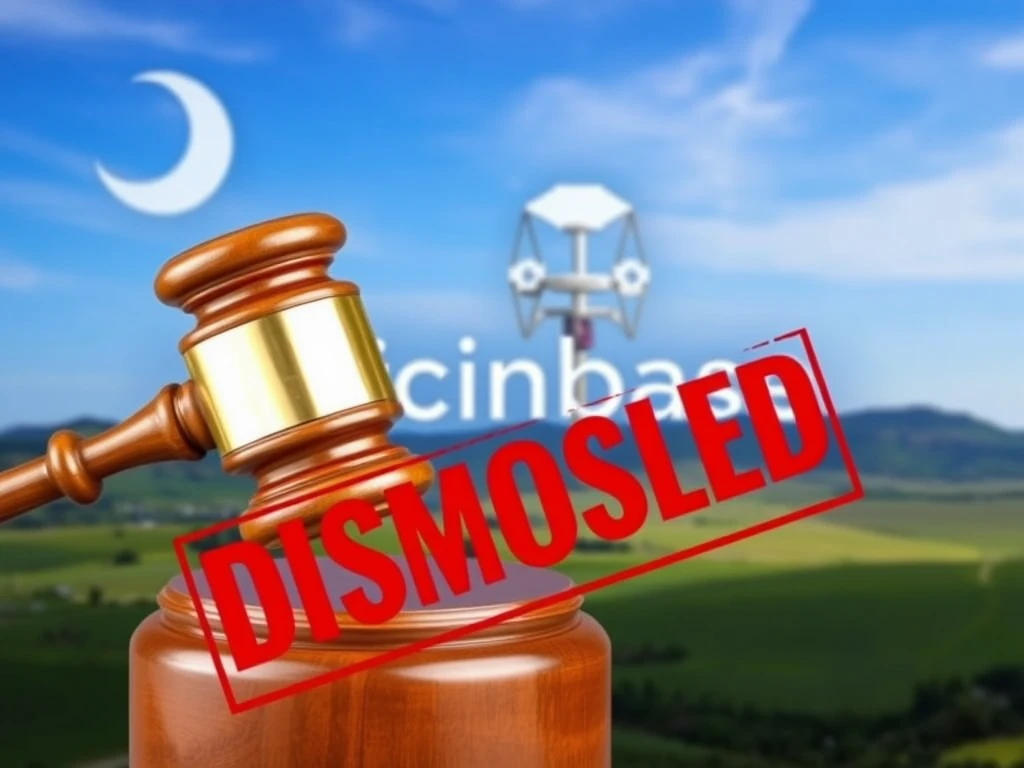Victory for Crypto: South Carolina Abandons Coinbase Staking Lawsuit

In a stunning turn of events, South Carolina has decided to dismiss its lawsuit against cryptocurrency exchange giant Coinbase concerning its staking services. This pivotal decision mirrors Vermont’s earlier dismissal, marking a significant moment for Coinbase and the broader crypto community. Is this the start of a wave of regulatory easing? Let’s delve into what this means for the future of crypto regulation in the US and for you, the crypto user.
South Carolina Dismisses Coinbase Staking Lawsuit: A Breakthrough?
Just weeks after Vermont dropped its similar case, South Carolina has followed suit, officially withdrawing its legal action against Coinbase. The lawsuit, which alleged that Coinbase offered unregistered securities through its staking services, was jointly dismissed on March 27th by the South Carolina Attorney General’s securities division and Coinbase. This coordinated dismissal has been hailed by Coinbase’s Chief Legal Officer, Paul Grewal, as a significant win. He expressed his optimism in a tweet, stating, “South Carolina just joined Vermont to dismiss its unfounded staking lawsuit against Coinbase. This is not just a victory for us, but for American consumers and we hope it’s a sign of things to come in the few states left that restrict staking.”
South Carolina just joined Vermont to dismiss its unfounded staking lawsuit against @coinbase. This is not just a victory for us, but for American consumers and we hope it's a sign of things to come in the few states left that restrict staking. pic.twitter.com/aH8x91mZp8
— paulgrewal.eth (@iampaulgrewal) March 27, 2024
The dismissal in South Carolina is particularly noteworthy as it was one of ten states that initiated legal proceedings against Coinbase back in June 2023. These actions coincided with the Securities and Exchange Commission’s (SEC) own lawsuit against the exchange. While the SEC’s lawsuit was dismissed earlier in February 2025, the state-level cases presented a separate hurdle for Coinbase. The states involved, alongside South Carolina and Vermont, included Alabama, California, Illinois, Kentucky, Maryland, New Jersey, Washington, and Wisconsin. With two states now withdrawing their lawsuits, could this be the beginning of a trend?
Why is the Dismissal of the Staking Lawsuit Significant for Crypto?
The implications of these dismissals extend beyond just Coinbase. Here’s why this news matters to the broader cryptocurrency landscape:
- Positive Regulatory Signal: States dropping lawsuits against crypto companies can be interpreted as a softening stance towards crypto regulation, or at least a re-evaluation of previous enforcement actions.
- Consumer Benefit: Grewal highlighted that South Carolina residents alone reportedly lost an estimated $2 million in potential staking rewards due to the lawsuit. Dismissals could pave the way for reinstating staking services in these regions, benefiting crypto holders.
- Clarity on Staking: The lawsuits against Coinbase revolved around whether staking services constitute unregistered securities. These dismissals might suggest a growing consensus (or at least less opposition) that staking, in certain forms, may not fall under that definition.
- Industry Momentum: Victories like these can boost morale and encourage further innovation within the crypto industry. It signals that reasoned dialogue and legal challenges can lead to favorable outcomes.
Bitcoin Reserve on the Horizon in South Carolina?
Interestingly, while dismissing the Coinbase lawsuit, South Carolina is also exploring a forward-thinking approach to cryptocurrency. On the very same day as the lawsuit dismissal (March 27th), a state lawmaker introduced the “Strategic Digital Assets Reserve Act of South Carolina.” This bill proposes that the state treasurer could allocate up to 10% of specific state funds to cryptocurrencies, with a particular emphasis on Bitcoin (BTC).
House Bill 4256, championed by Rep. Jordan Pace, explicitly mentions Bitcoin as a core component of the proposed Strategic Digital Assets Reserve. Unlike many other state-level crypto reserve bills, this one directly names Bitcoin, suggesting a focused approach. The bill even sets a high ceiling, allowing for a reserve of up to 1 million Bitcoin, mirroring the federal government’s increasing interest in digital asset reserves.
Today, I introduced H. 4256, the Strategic Digital Assets Reserve Act of South Carolina.
This bill would allow our State Treasurer to allocate up to 10% of state funds to digital assets like Bitcoin.
South Carolina must be forward-thinking and fiscally responsible. pic.twitter.com/hF8Wb40s0X
— Jordan Pace (@RepJordanPace) March 27, 2024
While the bill primarily focuses on Bitcoin, it does leave room for other digital assets, stating the reserve “wouldn’t be limited to Bitcoin.” This cautious yet progressive step indicates a potential shift in how states view and interact with cryptocurrencies – from regulatory challenges to strategic adoption.
What’s Next for Coinbase and Crypto Regulation?
With Vermont and South Carolina leading the way, the pressure may mount on the remaining eight states to reconsider their lawsuits against Coinbase. Grewal’s statement reflects this hope, urging these states to “take notice” and prioritize “commonsense consumer protections and clear rules.” The dismissal of the Coinbase lawsuit in these states could signal a broader trend towards more pragmatic and less restrictive crypto regulations at the state level.
Furthermore, the simultaneous introduction of a Bitcoin reserve bill in South Carolina paints a picture of a state potentially embracing crypto innovation while addressing regulatory concerns. This dual approach – dismissing enforcement actions and exploring strategic adoption – could become a model for other states navigating the complex world of cryptocurrency.
Final Thoughts: A Glimmer of Hope for Crypto Clarity?
The decisions in Vermont and South Carolina are undoubtedly positive developments for Coinbase and the crypto industry as a whole. Whether this marks a genuine turning point in crypto regulation remains to be seen. However, it undeniably offers a glimmer of hope for greater clarity, reduced regulatory friction, and a more constructive dialogue between regulators and the burgeoning digital asset space. Keep watching this space as these developments unfold – they could reshape the future of crypto in America.








